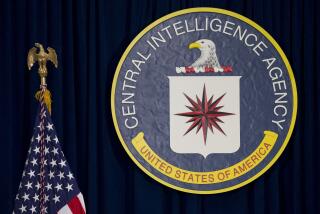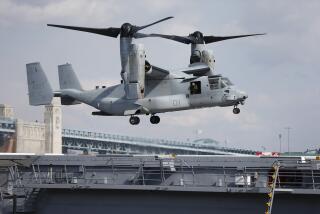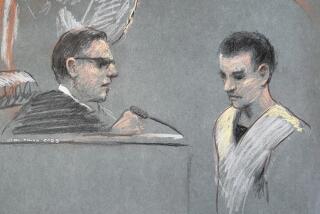Air Force removes commander, 9 others after cheating scandal
WASHINGTON — The Air Force said Thursday it was replacing the commander and nine other senior officers at a Montana air base responsible for 150 nuclear-armed missiles after finding they were unaware of widespread cheating by missile crews on proficiency tests.
Col. Robert W. Stanley, commander of the 341st Missile Wing at Malmstrom Air Force Base, is retiring and the other officers, all of them either colonels, lieutenant colonels or majors, have been removed from the unit and will face administrative reprimands, Lt. Gen. Stephen Wilson, head of the Air Force Global Strike Command, said at a Pentagon news conference.
“They weren’t aware this [cheating] was going on in any way, shape or form, and I think they should have been,” said Wilson, explaining the decision to remove the wing’s entire operational chain of command.
An investigation into the cheating scandal at Malmstrom, which came to light in January, has now implicated almost half of the base’s launch crew members, who either texted one another answers on multiple tests over a two-year period or knew about the practice and failed to take action, Wilson said.
Of the 190 launch officers at Malmstrom, 91 were found to be involved in the cheating or are still under investigation. Nine officers were cleared, the Air Force said.
The discovery has been a serious blow to the Air Force, which has long insisted that its nuclear missile crews operate by the highest standards of performance.
Even more embarrassing, the case has grown steadily larger. Initially, the Air Force said it involved only a few dozen captains and lieutenants who allegedly cheated only on one test.
Some former launch officers say cheating in various forms on the tests has been common for decades, though they say the pressure to achieve perfect scores has increased in recent years, ironically, even as the importance of nuclear weapons to U.S. national security has declined with the end of the Cold War.
Wilson acknowledged Thursday that in some cases classified information was being transmitted over cellphones, either in texts or as photographs — a breach of security procedures. Eight missile crew members remain under investigation for mishandling classified information.
Stanley’s retirement after a 25-year career was voluntary, Wilson said. But as wing commander, Stanley was facing the prospect of disciplinary proceedings that probably would have ended his Air Force career.
In a message Thursday announcing his retirement, Stanley said: “We’ve seen the reputation of our beloved wing, and America’s ICBM mission, tarnished because of the extraordinarily selfish actions of officers entrusted with the most powerful weapon system ever devised by man. As you are now learning, the ramifications are dire. Many lives will be permanently changed as a result.”
He added: “Had just one solitary airman spoken up for integrity, our leadership team would have been able to take action immediately. Tragically, peer pressure and the fear of being an outcast prevailed.”
Wilson said the Air Force was beginning the process of disciplining the launch crew members accused of cheating, and that the punishment would range from letters of reprimand for those who failed to turn in cheaters to courts-martial for those more deeply involved.
Wilson blamed the scandal on four officers who he said were “at the center” of the cheating ring.
No evidence of cheating was uncovered at two other air bases, one in North Dakota and one in Wyoming, where intercontinental ballistic missiles are based, Wilson said. No officer at those bases admitted to cheating or knowing about it, Wilson said, but no additional investigation was done because it would have violated the officers’ privacy rights, he said.
The 550 launch officers at the three bases take three written tests each month on missile safety, handling of launch codes and classified war plans. They also complete a monthly test in a simulator and an annual inspection, along with periodic unannounced inspections.
More to Read
Start your day right
Sign up for Essential California for news, features and recommendations from the L.A. Times and beyond in your inbox six days a week.
You may occasionally receive promotional content from the Los Angeles Times.







